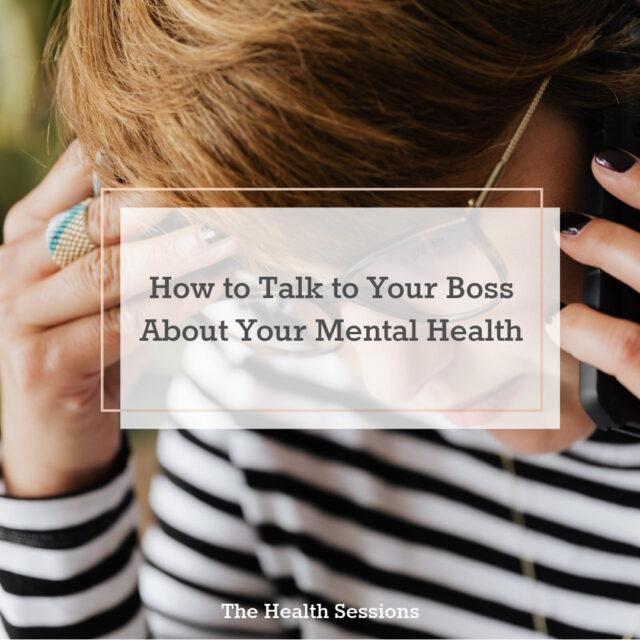Amor Fati: The Stoic Principle That Can Help You Accept Your Chronic Illness

This article is written by Sara Anderson.
According to the Centre for Disease Control and Prevention (CDC), mental health conditions are amongst the most troublesome health distresses in the United States, and 63% are part of the workforce. Mental health problems impact many workers, a fact that is usually ignored because the disorders can be hidden at the work place. Unfortunately, the stigma involved in having a psychiatric disorder in workers may make them hesitant to seek treatment, especially in the current economic statuses.
It is imperative to seek help whenever you feel like your mental health is compromised. But how do you start? How will you deal with the discussion when mental health is not recognized as part of a healthy office principle?
Supervisors usually think that no one in their organization is affected by mental health. Still, the truth is that in the average workplace, three to four sick days are usually taken by people who feel that their mind, rather than their body is a little bit under the weather.
Mental health discussions at the workplace are now becoming a custom. However, there are some ways you should approach the subject of mental health with your boss.

Knowing where you are with your mental health is crucial. The point at which you will reveal your mental health issues to your boss will depend on your condition, signs, ease levels, and the dynamics and culture of the workplace. Usually, mental health problems are very delicate topics, and the disclosure is very personal. It can be very uncomfortable making a massive statement about your mental health issues, especially if you are doing okay, and your work isn’t suffering.
It’s best if you speak to your boss when your mental health begins to impact your work and ability. Don’t wait until you hit a level of anxiety or depression. Remember that chronic stress symptoms can dramatically increase your likelihood of anxiety or depression.
The earlier you talk to your boss about your mental health, the better. If you’re going to ask for some days off because of some emergency or personal problem, know that you’ll be asked about the nature of the problem. Therefore, at some point, you will have to disclose more details about your condition to your boss, not everyone.
It doesn’t matter if you are having a conversation with your boss; reveal as much as you feel you are comfortable with. You don’t necessarily have to disclose all about your family’s history with a mental health issue, neither do you need to explain all your episodes of panic attacks.
For instance, if you have ADHD and are not comfortable going into the details with your boss, just say that you are having trouble with concentration impacting your capacity to work. Alternatively, you can disclose that you have a medical condition without really mentioning your diagnosis by the name.
Knowing your rights under the law enables you to be more mindful of a discussion with your boss. According to the Americans with Disability Act (ADA), you have a right to reasonable accommodations for a disability. Depending on your mental health issue’s nature, you may need accommodations to help you stay organized, work competently and maintain strengths and concentration during the day.
The ADA also prohibits any judgment against people with disabilities in workplaces. You have rights. Therefore, you should not be worried about what your boss will say about your condition. The law allows people to be accommodated to a reasonable degree.
Instead of just assuming some days off, consider discussing with your boss about flexible hours that aren’t determined in advance but whenever you might need it.

Sometimes, it can be hard to speak about what you are going through. In this case, you should let a professional speak for you. If you are having treatment at a facility, the professional will explain to your boss how long the program will take and why you need time from work.
Your boss has a responsibility to make reasonable adjustments for you. For instance, changes to a job that can allow you to do your responsibilities more successfully. However, as much as you are entitled to reasonable accommodation, it is up to your boss to determine what ‘reasonable’ means. Your boss might not directly agree to every request that you have, so be open to working together to get innovative solutions that will benefit the two of you.
If you don’t have a good relationship with your boss and noted that they wouldn’t understand your situation, involve Human Resources. The good thing about involving the HR is that they cannot share the reason behind your medical accommodations if you don’t want them to.
Discussing your mental health with your boss can be a difficult thing. Just one mistake, and your boss will come out from your discussion with little understanding of what you need and your treatment’s purpose. If possible, design out a script of what you want to say.
Practicing your conversation can play a significant role in reducing anxiety. Consider practicing the conversation with a friend or a colleague. Alternatively, you can practice the conversation in front of a mirror. This will help you see what your body language looks like and how it will match your words.

Being honest about your mental health enables you to create an open and honest work background. You might be surprised by how you can get relieved just by disclosing what you are going through to your boss.
As hard as it might feel to have a conversation with your boss, things can only get better. Plus, you might be surprised about how receptive your boss can be. Remember that your boss cannot offer you support if they don’t know you need it.
By choosing to have a conversation with your boss, you will be able to make changes that will help you. Take good care of yourself outside the workplace, too. Exercise and have a balanced diet. Don’t be embarrassed about your mental health issues, and more so, don’t let it prevent you from being happy and healthy at your workplace.
As long as you know your rights, talking to your boss will be easy. Don’t shy away from bringing in a therapist if needed; they can help make the discussion more productive and positive. Visit us at ezcareclinic.com today for the comprehensive treatment of any mental health issue.
Author Bio: Sara Anderson is the head of content for the EzCare clinic, a medical clinic that provides world-class health care services. She has been associated with the health care industry for 10+ years and specializes in health care and medical content.